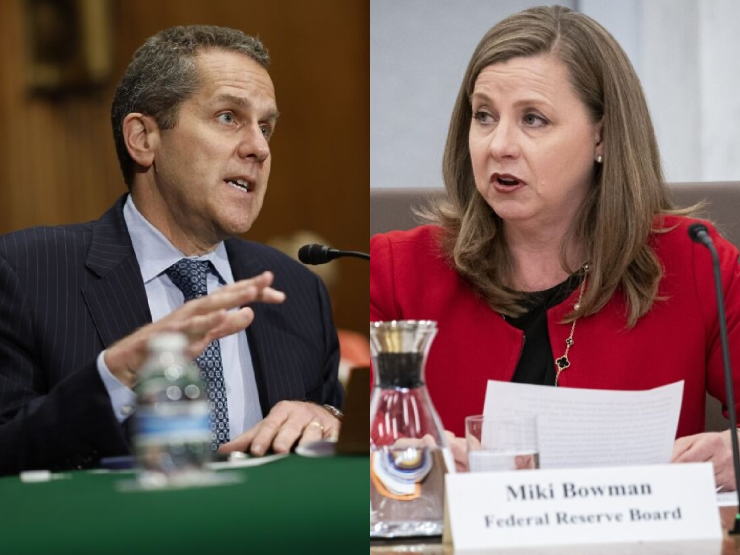
There is a lack of consensus on the Federal Reserve Board about what bank regulation and supervision
Michael Barr, the Fed's vice chair for supervision, laid out several changes he'd like to see in his report on the failure of Silicon Valley Bank last month. But
"The report was supposed to set the tone for reforms down the road, and a lot of those reforms pointed to greater scrutiny of banks and explicitly raising capital requirements and liquidity requirements in various forms," said Derek Tang, co-founder of the Washington-based research firm Monetary Policy Analytics. "The way Bowman wrote her speech suggested that she would not just stand idly by and just go with whatever Barr puts on the table."
Bowman, in a speech delivered Friday, said the findings of Barr's report do not support its conclusion that more stringent capital requirements would have prevented the failure of Silicon Valley Bank. She cautioned against a "radical reform of the bank regulatory framework" and noted her "extreme" concern about potential changes to tailoring standards. She called for the Fed to commission an independent review of Silicon Valley Bank's failure.
Bowman did not reference Barr by name but said the fact that his report was a "self-assessment prepared and reviewed by a single member of the Board of Governors" presented further credibility issues for the Fed should it use the findings to support new standards or regulations.
Karen Petrou, managing partner at Federal Financial Analytics, said the language of Bowman's speech indicates some fundamental disagreements within the Fed that could prove difficult to bridge.
"[Fed Chair Jerome] Powell has essentially decided that he endorsed the Barr report and then you have Bowman saying only one board member saw it. Clearly, there seems to be some internal issues there in terms of transparency and collegiality," Petrou said. "Whether those continue and then how they drive what the others do is much harder to predict because it's not policy, it's personal."
Bowman's remarks came just ahead of Barr's scheduled appearances this week before the House Financial Services and Senate Banking committees. He is expected to face questioning about the findings and conclusions of his report.
Bowman's commentary is part of a chorus of criticism that has emerged in the weeks since Barr's report was published. Former Vice Chair for Supervision Randal Quarles, whose policy changes are maligned in the report,
Some Republicans in Washington have also taken shots at the report since its release. Rep. Andy Barr, R-Ky., chair of a subcommittee of the House Financial Services Committee, called it "self-reflective, revisionist and sanctimonious."
In his written testimony for this week's hearings, which was published in advance on the Fed's website Monday evening, Barr reaffirmed his views that the Silicon Valley Bank failure highlighted the need for stronger capital requirements and better supervisory practices.
"Recent events demonstrate that we — as regulators — must do better," Barr said. "We need to ensure that we have strong supervision and regulation to make the financial system safer and fairer, in support of an economy that serves the needs of households and businesses."
As the Fed's chief regulator, Barr has the authority to set the central bank's agenda on regulation, but policy changes must be put to vote by the full board. A "no" vote by Bowman alone would not be enough to derail the reforms discussed in the Barr report — including expanding more stringent capital and liquidity standards to banks between $100 billion and $250 billion of assets and requiring them to hold long-term debt — but it could complicate the matter.
The Fed has historically favored consensus in its policymaking, particularly when dealing with high-profile issues. Dissents occur, but rarely. In 2018, when then-Fed Gov. Lael Brainard voted against a measure to tailor requirements for the supplemental leverage ratio, it was the first publicly disclosed "no" vote in six years.
Brainard went on to vote against several more regulatory changes spearheaded by Quarles in 2018 and 2019. Bowman and Gov. Christopher Waller each voted "no" twice last year. Bowman opposed a rule on
Tang described Bowman's speech last week as a "warning shot" to Barr and Powell, who endorsed Barr's findings and said he would support the corresponding reforms. By threatening dissent, he said, she could encourage Barr to moderate some of his proposals before bringing them to the board.
While Powell may have been willing to take a split vote in 2019, when Congress broadly supported the Fed's reform efforts, Tang said the current, more devise environment could make the Fed chair more willing to compromise to achieve unanimity.
"Powell wants and probably really needs a united front. That's very important to him. It was very important during the tightening cycle, it was very important for when they responded to the first two bank failures, when they had systemic risk exceptions and 13(3) facilities. That's what he's really aiming for," Tang said. "If he doesn't have that, then it brings up a lot of questions about whether this is the right course of action."
As Barr noted in his testimony, any changes that materialize in the wake of the Silicon Valley Bank failure will not take effect for years. Each will be put through an extensive notice and comment process, during which members of the public can weigh in on proposals and the board can adjust accordingly.
Still, even with the benefit of time, reaching a consensus on regulatory changes might be easier said than done. Petrou said recent comments by Bowman and Waller — who, in a speech last week, said climate change posed no systemic risk to the banking sector — demonstrate a deepening divide between the two members and the rest of the board. Bowman and Waller are the only two remaining members appointed by former President Donald Trump.
"It would appear that there are already considerable divisions," Petrou said. "Otherwise, the speeches would not have been as direct and, essentially, confrontational as each of them was."






